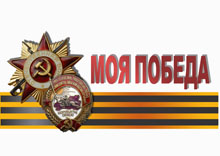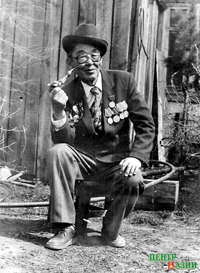 As part of the special project “My Victory”, the “Center of Asia” journal started publishing old photographs from the war years, as well as our compatriots’ memoirs from those brutal years. This is a letter from Aziana Khomushku about her grandfather. As part of the special project “My Victory”, the “Center of Asia” journal started publishing old photographs from the war years, as well as our compatriots’ memoirs from those brutal years. This is a letter from Aziana Khomushku about her grandfather.
Roman Serenmayevich Khunai-ool was my maternal grandfather. He was the first and only person of the Chaa-khol sumon of the 1934-1936 years, who became a teacher in the years of the Great Patriotic War – at the age of 16 years. This is how he first started going to school. In the ‘30’s of last century, teachers used to travel around the arat stations, to sign up children who were to start going to school in the fall. My great-grandfather had an older son, Kongar-ool, who was signed up by the teachers. But when the fall came and it was time to go to school, Kongar-ool refused to go. Then great-grandfather called his second son – Khunai-ool, and told him” “Son, there is nobody in our whole clan who would deceive teachers. Here is a piece of sugar – that is a great rarity, which is sometimes given to the smartest, most obedient children. Go and study, my son, and you will become the pride of our whole clan Ulug Tulush; we believe in you.”
 So the boy named Khunai-ool - son of the sun and the moon – started to study diligently. When he finished seven grades at the age of 16 years, in 1943 – he became a teacher in the place Saryg-Bulun, which is now Erzin in the Erzin district. So the boy named Khunai-ool - son of the sun and the moon – started to study diligently. When he finished seven grades at the age of 16 years, in 1943 – he became a teacher in the place Saryg-Bulun, which is now Erzin in the Erzin district.
There were 260 pupils and 5 teachers in the school: Kombu, who was the principal, Danzyn, Khunai-ool, Dovunchap and Mezhova. Mezhova taught Russian language, and Khunai-ool, who knew Russian well, translated for her.
In 1944, my grandfather was sent to a far-off Kachyk – on the border with Mongolia. Special difficulties waited here for the teachers. There were more than 50 pupils, and only two teachers – Aranchor and my grandfather.
The ten-year-olds and fifteen-year-olds all sat in the same classroom. The children did not know Tuvan language, they spoke Mongolian. It was very difficult to communicate with them. Instead of textbooks, they had little “Bistig Azhyl” - “Our Work” brochures, which they used as methodical literature. There weren’t enough notebooks, and they had to cut one pencil into three pieces.
However, the children were very diligent, everybody wanted to become literate. At that time, everybody worked under the motto: “Down with illiteracy! Everything for education!”
The teachers told the children: “Every good grade that you get is a strike against the enemy!”
Presents for the front, as well as the teachers’ salary, were more strikes against the enemy. This is how my grandfather remembered those days: “We, the teachers, would sign for our salaries without even knowing how much we were getting. Our salaries went straight to the front to help the soldiers who were defending Russia.”
In winter, the teachers together with the children would travel on skis to the distant herders’ stations, to collect presents for the front, and to do enlightening work among the population.
The children hunted partridges and hares in their free time. They handed them over to the local store, where the storekeeper would send them on to the kozhuun center Saryg-Bulun, and from there, to Kyzyl. That also counted as help for the front.
During the days, we worked at the school, and in the evenings, we produced plays and shows. We played for the people. We announced the latest news from the front.
The people were interested in everything, but much was incomprehensible to them. They kept asking – what is a “demir-oruk” – railroad train, how does a machine-gun shoot, and what kind of an evil man is this Hitler.
I studied military skills at school, that is why it was up to me to explain so many of these things.
My hardest, but also the most memorable and full year in the distant Kachyk ended in 1945, when I was called back to Saryg-Bulun.
The teacher Mezhova went to replace me in Kachyk. She not only taught Russian, but she also taught the children to bake bread and to whitewash the houses. The lime for that was brought on horseback from the center, and in winter – on sleighs.”
There is yet another story of those days that our family keeps in its memory: how, at the beginning of the war, my great-grandfather Serenmaa Tulush gave his best racehorses as a present to the front – more than twenty of them, and also the strongest bull, which belonged to his son Khunai-ool.
My grandfather Roman Serenmayevich Khunai-ool lived a big life – eighty years; he was born in 1926 and died in 2006.
During the last several years, as a worker of the rear, every year before the Day of Victory he would receive a letter of gratitude from the President of Russia, Vladimir Putin, written with golden letters.
And grandfather was always so happy to receive these letters. He was very proud of that golden writing.
|
